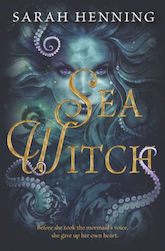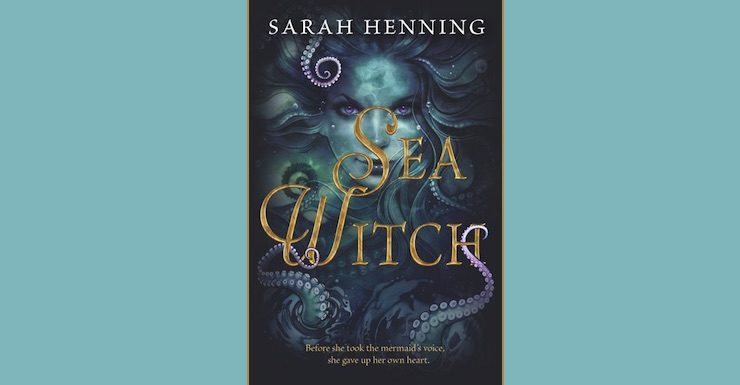Sea Witch is a peculiar novel. Told from the point of view of adolescent Evie, an outsider who must keep her despised magic secret lest she be condemned to death, the novel charts Evie’s story as the childhood friend to two princes. She’s attracted to one of them, and the other one is attracted to her, but their respective stations mean it’s unlikely anything will ever come of it.
Into this traditional adolescent dance comes Annemette, the spitting image of Evie’s drowned best friend Anna, a mermaid walking on dry land, who tells Evie she’ll have a soul and be able to stay a human if her true love—Prince Nik, Evie’s best friend—loves her back and kisses her before three days are over. Annemette insists she’s not Anna, has nothing to do with her, but Evie sees in her a trace of the girl she lost, and immediately adopts Annemette’s cause as her own.
(I will admit I was half-rooting for the true love to be friendship between women, but that’s not in Sea Witch’s plan. I’m not entirely convinced it passes the Bechdel-Wallace Test. Perish the thought that it should include people of colour or any hint of queerness. It does have at least one dead mother, though!)
Buy the Book


The Sea Witch
That’s not the thing that strikes me as peculiar. What’s peculiar about Sea Witch is the worldbuilding. The setting is Scandinavian, and of a post-medieval vintage: the novel mentions Denmark and Sweden, and the courtly manners of the princes definitely do not predate the 1700s. The presence of a steam yacht places the story in the mid to late 19th century, but the fact that the story sets itself in a tiny independent kingdom, neighboured by another tiny independent kingdom, suggests that the author imagines a more medieval world. (There are no newspapers, either.) The people mark Sankt Hans Afen (St. John’s Eve) by burning effigies of witches on bonfires, but swear by “the gods” and honour a power (a goddess) called Urda. Sea Witch sets itself neither in a well-worked-out secondary world, a fantasy world, nor in a place and time of our own world to which magic has been added. It’s set, essentially, in Disney Princess Land, an indeterminate mixed-up fairytale past where culture and context scarcely matter.
In fantasy and science fiction, the world is as much a character as any of the individuals with which the work concerns itself. That’s part of its appeal—to someone like me, who delights in social and cultural detail in historical settings (or settings inspired by elements of history), it’s a large part of the appeal. But Sea Witch spurns the possibilities of a deeper, richer, more grounded world.
Spoilers.
It turns out that Annemette is Anna—turned mermaid-soulless, turned human again, full of a desire for vengeance, since she blames both princes and Evie for her drowning. (Her plan to make sure that all their lives are ruined, destroyed, or ended has some significant gaps.) This is revealed rather swiftly, in contrast to the leisurely build of the romantic entanglements between the four major players: beware of the angry mermaid behind the curtain! But Evie thwarts her dastardly plan, albeit at the cost of a transformation into a sea creature with tentacles from the waist down, and the novel ends with a mermaid of another generation coming to her in search of the means to become human.
Over the years, Hans Christian Andersen’s “The Little Mermaid” has been adapted many times. So many times, in fact, that it is difficult to see what a fresh adaptation might add to the conversation. I’m not convinced that Sea Witch really uses an interesting angle—the eponymous Sea Witch—to any striking effect.
Sea Witch has its weaknesses as an adaptation. I have discussed its indeterminate worldbuilding already, but it is also weak in terms of its structure and emotional impact. While a narrative recounted from Evie’s point of view is a solid choice for a story focused on her romantic entanglements, the way in which Sea Witch switches to a potted history of vengeful Anna for its conclusion, rather than allowing her a viewpoint earlier, robs the story of real emotional impact. A story that paralleled Evie and Anna might well be a stronger one, for Evie accepts Annemette at face value, and so the narrative lacks any real underlying tension apart from the romantic one—which is not strong enough to support the sudden switch as the climax and conclusion approach. And for me, the characters were more types—and not very consistent types—than people, which created some barriers to enjoyment.
Henning’s prose is smoothly readable and the novel is sufficiently entertaining to keep one going. But if I sound cavalier about its merits, it’s because it left no real impression other than a sense of missed opportunities and lingering dissatisfaction.
The Sea Witch is available from Katherine Tegen Books.
Liz Bourke is a cranky queer person who reads books. She holds a Ph.D in Classics from Trinity College, Dublin. Her first book, Sleeping With Monsters, a collection of reviews and criticism, was published in 2017 by Aqueduct Press. It was a finalist for the 2018 Locus Awards and is nominated for a Hugo Award in Best Related Work. Find her at her blog, where she’s been known to talk about even more books thanks to her Patreon supporters. Or find her at her Twitter. She supports the work of the Irish Refugee Council, the Transgender Equality Network Ireland, and the Abortion Rights Campaign.










